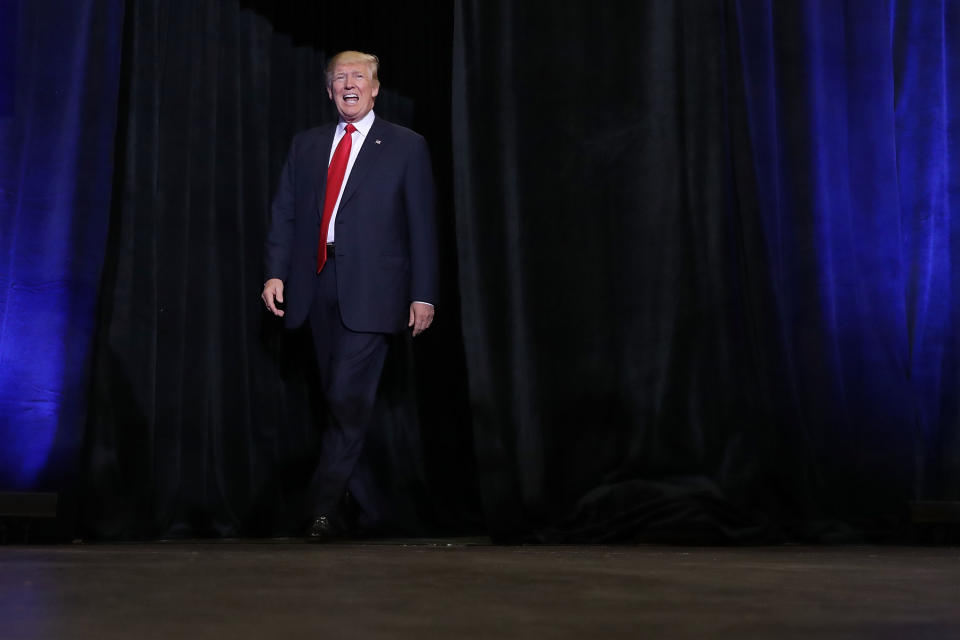How Wall Street is trying to make sense of the stunning stock market rally
Stock prices crashed as it became clear that Donald Trump would be elected the next President of the United States. And then they did a complete reversal to actually rally during the first trading day after the votes were counted.
The Dow Jones Industrial Average (^DJI) closed at an all-time high on Wednesday, and looks to go even higher on Thursday.
Just when you thought the stock market was starting to make sense, it goes ahead and does the exact opposite.
The markets were supposed to get crushed
Ahead of Election Day, Wall Street’s stock market experts were in broad agreement that a surprise victory by Republican candidate Donald Trump would be met by a sharp sell-off, ranging somewhere between -3% to -15%. Yahoo Finance reported on this multiple times.
What were behind these bearish calls?
For months, candidate Trump employed a divisive tone as he promised aggressive actions, including renegotiating or withdrawing from NAFTA, tightening the screws on immigration, and pressuring the Federal Reserve and its monetary policy. Most of his promises were considered bearish and recessionary. At the very least, they introduced more uncertainty, which by definition increases the premium investors demand for taking on risk.
On the night of the election, stock prices plummeted as the odds of a Trump win improved. When it became clear that Trump would win, the futures market hit “limit down,” which is just another way of saying that prices would’ve gone lower if the exchanges didn’t step in. S&P 500 futures (ES=F) were down by an eye-popping 5%.
And then the exact opposite happened
As the world awaited the US stock markets to open on Wednesday morning, traders slowly bid prices back up. And in a total shocker, stocks erased all losses and opened in the green.
When it was all said and done, the S&P 500 (^GSPC) closed at 2,163, up 23 points or 1.1% for the day. It would’ve been considered an impressive rally under any circumstance.
(Before we get to the big picture, it’s important to note that there were plenty of losers in the market. IT stocks and utilities tumbled, as financials and health care stocks surged. Our discussion today about the net effects.)
What happened? Were the stock market forecasters dead wrong? Was Donald Trump the better candidate all along?
The most common explanation for the turnaround is tied Trump’s victory speech.

“To all Republicans and Democrats and Independents across this nation, I say it is time for us to come together as one united people,” Trump said in the wee hours of Wednesday morning. “For those who have chosen not to support me in the past, of which there were a few people, I’m reaching out to you for your guidance and your help so we can work together and unify our great country.”
“The President-elect’s more conciliatory tone and pledge to work together with his opponents came as a positive surprise to market participants, many of whom had expected more of the aggressive rhetoric that marked his campaign,” UBS’s Mark Haefele said.
Indeed, while he could’ve taken a victory lap and kicked his opponents while they were down, he didn’t.
“Trump’s gracious acceptance speech has encouraged hopes that he will moderate his more extreme positions when actually in office,” Capital Economics Julian Jessop said. “Indeed, it is fair to ask ‘does Trump mean Trump?'”
This is not to say that Trump won’t eventually push for policies deemed unfriendly to the markets. All these arguments suggest is that Trump is being seen as less bad than previously thought.
Let’s not get too carried away
There are plenty of other theories for the rally, including the suggestion that this is very similar to June’s surprise “Brexit” vote, when the UK unexpectedly voted to leave the European Union. Initially, markets cratered, and then they came back.
But rather than belaboring the rationale for one or two days’ worth of rallies, it’s best to just stop now. Because who knows what the market will do tomorrow or the day after that?
If there’s one lesson to be learned here, it’s that markets are unpredictable and often times they flat out won’t make sense.
As Gluskin Sheff’s David Rosenberg once said: “Nobody ever said it had to make sense.”
Click here for Yahoo Finance’s complete coverage of the 2016 presidential election.
–
Sam Ro is managing editor at Yahoo Finance.
Read more: